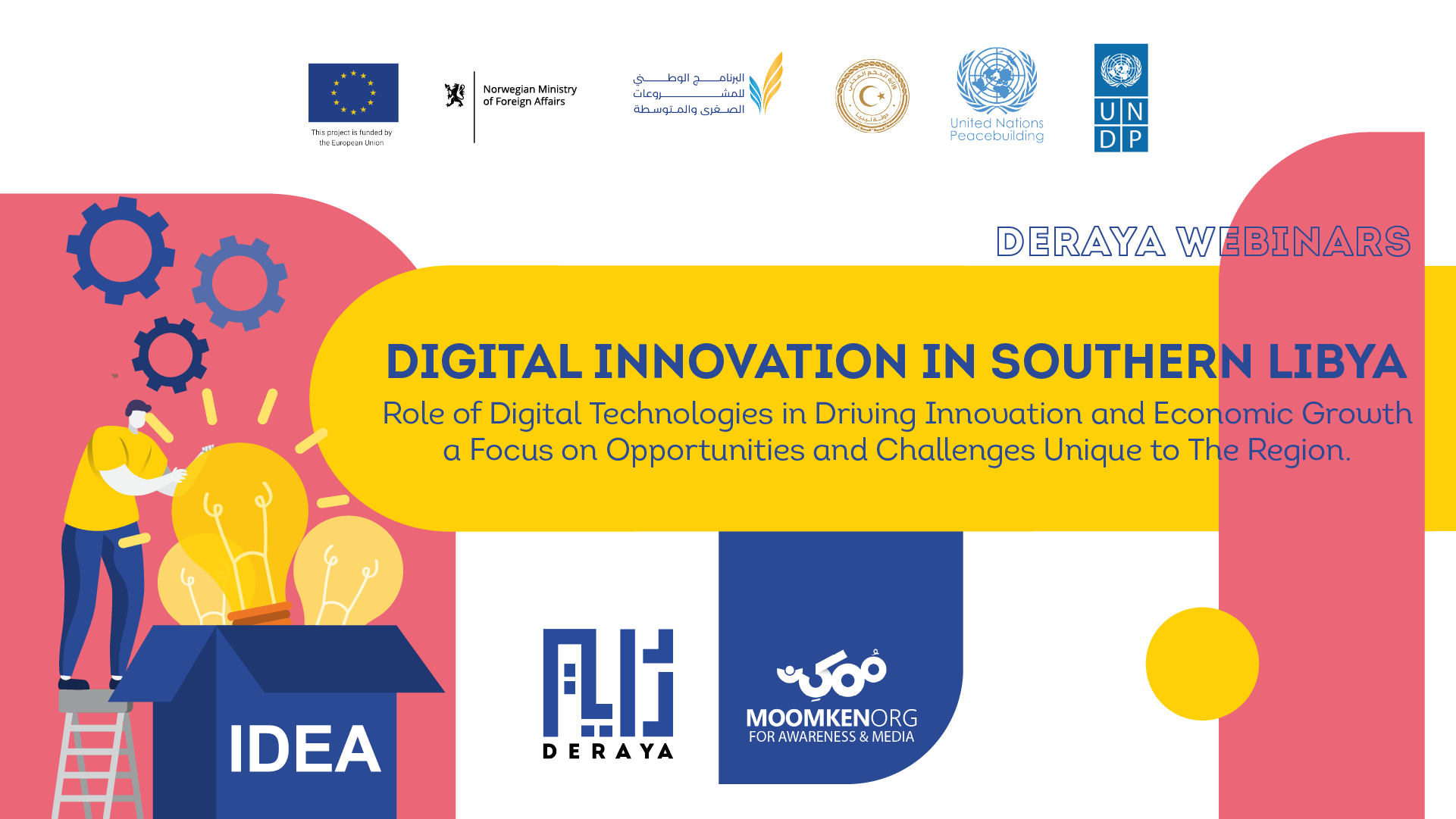A digital renaissance is unfolding, transforming challenges into opportunities through the power of technologies like artificial intelligence, big data, and virtual reality. This transformation is not only enhancing efficiency and productivity but also fostering creativity and collaboration among the local population. The emergence of tech startups and incubators is a testament to the region's growing potential in the digital economy. Digital innovation refers to the use of digital technology to find new solutions to challenges or to improve existing processes. This includes using technologies such as artificial intelligence, big data analytics, computing, virtual reality, augmented reality, and others to create new products or services, or to enhance current processes in more effective and efficient ways. In recent years, southern Libya has seen increased efforts to promote digital innovation and use technology to improve living conditions and boost economic development. This includes employing technology in education to provide remote learning opportunities and improve digital health processes and remote healthcare services. It also involves enhancing e-commerce and online shopping, and using technology in smart agriculture to improve agricultural productivity and food security. Moreover, digital innovation encompasses the implementation of online government services to facilitate access to public services, and the use of technology to boost tourism through digital marketing and developing tourism infrastructure.
The Deraya webinar hosted a number of experts in the field, Attia Al-Senussi Ouhida, Director of Innovation and Excellence Support Offices and Supervisor of Sabha Digital Academy, Anwar Al-Fakhal, Executive Director of Al-Khaliyah Company, and Rima Atiqah, a digital transformation expert, where they all shared their personal insights based on their extensive experience on the topic of digital transformation and its importance in Libya, especially in the southern region.
The Current State of Digital Transformation
The current political, economic, and social situations in Libya present numerous hurdles to digital transformation. Nonetheless, various efforts and projects are being implemented to foster digital transformation in the country. These efforts include strengthening technical infrastructure, enhancing digital education, expanding e-commerce and online purchasing, and introducing e-government to improve access to government services. Furthermore, the health and education sectors are increasingly relying on digital technology to improve services and care. Despite the challenges, political will and appropriate investments have the potential to expedite digital transformation, enhance economic growth, and improve citizens' quality of life. Attia Ouhida added, "Sabha Digital Academy aims to spread the culture of digital transformation in institutions in Sabha and the entire southern region. We aim to introduce technology and AI to increase production and services. We coordinated with the municipal council to give us institutions to work on, and we created applications to facilitate communication between institutions and citizens, despite the limited resources and the cultural challenge of digital transformation."
Challenges and Solutions
Libya faces multiple challenges in promoting digital transformation, including the lack of technical infrastructure, inadequate digital education, cybersecurity challenges, low technical awareness, economic challenges, and insufficient digital laws and regulations. Solutions to these challenges include improving technical infrastructure, enhancing digital education, strengthening security, increasing technical awareness, boosting digital investment, and enacting appropriate digital legislation and policies. Rima Atiqah noted, "Despite the hurdles and difficulties in the southern region, as well as technical and social disparities, there is a high need for learning and education among southern youth, particularly women. Their efforts have yielded exceptionally good results, as confirmed by their trainers."
To address these challenges, Libya can focus on investing in building technical infrastructure, enhancing digital education programs, implementing cybersecurity measures, raising technical awareness through training and workshops, advocating for economic support for digital initiatives, and developing comprehensive digital laws and regulations to promote a safe and efficient digital environment. Additionally, partnerships with international organizations and governments can provide valuable resources and expertise to support Libya's digital transformation efforts. Rima Atiqah mentioned, "The challenges are the refusal to change and the fear of the unknown. It is natural to resist difference or any work that feels like it might threaten your job, stability, and the life you have built. Therefore, raising awareness in this area is very important to overcome this feeling and keep up with the times in development and prosperity."
Digital literacy remains a significant barrier in Southern Libya, hindering the meaningful adoption of digital technologies. Efforts to promote digital literacy through training programs and community workshops are essential to empower residents and maximize the benefits of digital innovation. By addressing this barrier, individuals can gain the skills and confidence needed to navigate the digital world and seize opportunities for personal and professional growth. Ultimately, promoting digital literacy can lead to increased access to information, communication, and economic opportunities in Southern Libya. She also added, "There is always a disparity in the level of opportunities. Opportunities in the south have not been as available as they have been in the north. I have seen young people in the south with the highest level of commitment and interest in any subject presented to them. The geographical expanse of the country may be a reason for the lack of connection between cities and the lack of required support and attention."
Social perspective revolves around the region's cultural and traditional values. These ideals may shape how people view and embrace technical innovations. Some people may perceive digital innovation as a threat to their way of life, whereas others may see it as a chance for advancement and growth. A challenge could be perceptions regarding the relevance and applicability of digital technologies to the socio-economic landscape of Southern Libya. Lack of awareness or understanding about the potential benefits of digital literacy may hinder its widespread adoption. Therefore, efforts to educate and raise awareness about the significance of digital innovation are paramount. Rima Atiqah mentioned that, " a challenge faced by entrepreneurs is the social perception that this field is just a hobby rather than an important specialty on which the foundations of the future depend. Therefore, it's necessary to raise awareness and help people understand that this is no longer a luxury but a reality. If we do not give it enough attention, the modern world will surpass us, and we will find ourselves at the bottom of the list of underdeveloped countries."
Another challenge is the lack of access to resources and support for aspiring entrepreneurs in the digital innovation field. Without proper guidance and assistance, many talented individuals may struggle to bring their ideas to fruition, hindering progress in this crucial sector. It is essential for governments and organizations to invest in programs that provide the necessary tools and mentorship for these innovators to thrive.
Effective Strategies and Programs
To promote digital transformation in Libya, comprehensive strategies focusing on several aspects need to be developed. These should include improving technical infrastructure, enhancing digital education, strengthening cybersecurity, supporting innovation and entrepreneurship, developing e-government, and fostering public-private partnerships and research and development. By effectively implementing these measures, Libya can achieve a digital transformation that promotes comprehensive development and keeps pace with global advancements in the digital age. Attia Ouhida mentioned, "The major issue is the lack of a comprehensive and clear strategy for digital transformation in Libya in general, and in Sabha specifically. The main obstacles we face, which prevent us from making a real contribution, are the lack of resources and necessary support."
Additionally, strategic guidance should be enhanced, and the capabilities of the workforce in the technology sector should be boosted through dedicated training and development programs. Foreign direct investments in the technology sector should be encouraged, and appropriate financial and tax incentives should be offered to attract investors.
Digital technology can be used to boost vital sectors such as agriculture, industry, and tourism to promote sustainable economic development. The government should also adopt policies that encourage the use of technology to improve public services such as health, education, and transportation. He also added, "Regarding awareness and culture, we are striving to create workshops in Sabha to spread the idea of digital transformation and the meaning of digitization. We also aim to hold training courses in this field and establish innovation awards in digital transformation to motivate anyone with a digital idea that can contribute and create, and then turn it into a real project that builds and develops the southern region."
Finally, the experts during the webinar emphasized the necessity of collaboration among the government, commercial sector, and civil society in ensuring the success of digital transformation efforts in Sabha and beyond. By working together, they can leverage each other's strengths and resources to create a more digitally inclusive and innovative society. They should use international experiences and knowledge in digital transformation through international cooperation and partnerships with relevant international and regional organizations.
Role of the Public and Private Sectors
The public and private sectors can collaborate more effectively by sharing knowledge, expertise, and resources. For instance, the government can provide financial and legislative support to encourage private companies to invest in technological fields such as digital health and smart agriculture. This collaboration can lead to the development of cutting-edge solutions that benefit society as a whole. By working together, both sectors can drive economic growth and create new opportunities for citizens in various industries. Anwar Al-Fakhal stated, "Ideas come from the private sectors, so we must build a bridge between the private and public sectors to create a significant shift supporting digitization and AI, making us experts in our respective fields."
Private companies can offer technical solutions and digital services to enhance the efficiency of the public sector, such as developing electronic systems for managing human and financial resources and delivering government services online. These joint collaborations can contribute to promoting digital transformation in Libya and achieving comprehensive and sustainable development. Rima Atiqah added, "A clear link has begun to emerge between society and the state, united by digital and service-related topics. Civil society is trying to adopt modern policies on digital transformation to keep pace with the times and ensure the prosperity of the south. Our constant hope is to see the southern region fully enjoying stability and providing the necessary job opportunities for people with immense capabilities, particularly in the digital field."
Future of Digital Transformation
The future of digital transformation appears positive, with stronger technical infrastructure and a greater emphasis on technological innovation and entrepreneurship. The digital sector is expected to grow as technology is used in critical sectors such as health, education, and agriculture, while e-government services continue to improve. With continued investment and improved collaboration between the public and private sectors, entrepreneurs may make tremendous progress in digital development and increase their attractiveness as a regional hub for technical investment.
This growth will likely lead to job creation and economic development, further solidifying the role of digital transformation in driving overall progress. Additionally, as more industries adopt digital technologies, there will be a greater need for skilled professionals in areas such as data analytics, cybersecurity, and software development.
دراسات الحالة الأخري
At the beginning, we must understand that...
The Moomken Organisation hosted Hind Al-Bashari,...






